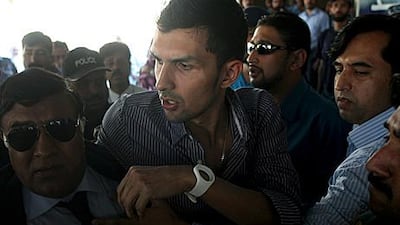Zulqarnain Haider promised much in his brief international cricketing career, but what he will be remembered for is an epic media soap opera which shows no signs of ending in the foreseeable future.
It did not require many heroics to displace the butterfingered Kamran Akmal. But Haider, a lanky young 24-year-old wicketkeeper from Lahore, made headlines with a solid display behind the stumps combined with a composed 88 against a formidable English bowling attack in a Test match in Birmingham last summer.
It had appeared that, against all probability, Pakistan had finally stumbled across a reliable stopper — one who would play a part for many years to come — and the sun had finally set on the Kamran dynasty.
______________
Other cricket columns
• Ahmed Rizvi on reaction in India to Fletcher appointment
• Dileep Premachandran on IPL's lower TV ratings
_______________
A broken thumb meant Haider was forced to return home and Kamran was recalled.
On his return to Pakistan, Haider, in true style, could not help but throw in a sly remark that other influences were at hand to undermine him and keep him from playing. It was the first instance we heard Haider cry wolf.
However he had done enough to be noticed and his overall credentials had drastically improved.
While he had been brought in primarily as a wicketkeeper, his impressive display with the bat meant that he was drafted in for the one-day series against South Africa in the UAE.
Yet another valuable contribution followed in the fourth one-day international (ODI) which helped level the series. Haider was slowly but surely becoming part of the furniture.
He attended the team match practice as normal, packed his bags and sometime before the beginning of the fifth ODI, with passport in hand, walked out of the team hotel to begin one of the most bizarre sagas to engulf Pakistani cricket.
This coming at the tail-end of the other crisis being played out in Pakistani cricket (thanks to the certain trio by the name of Salman Butt, Mohammad Asif and Mohammad Aamer).
Upon arrival in England, what followed was an even more intriguing and, at times, comical set of appearances in Tandoori takeaways and hotels with the media hungry for his every quote - always promising to say a lot but never really saying more than what the local vegetable seller at the corner of Gaddafi Stadium already knew - here was something rotten at the core of the Pakistan Cricket Board (PCB).
However, on closer scrutiny, his version of events seemed far from credible.
To start with, his claims of being approached by an Asian man in Dubai did not help his cause due to lack of any positive proof.
Secondly, he abandoned the team mid-series without any communication with team management, the International Cricket Council's anti-corruption unit or other authorities.
To top it all off, Haider "escaped" from Dubai, one of the safest cities in the world, leaving his young family in Pakistan.
Given the general security situation in Pakistan and the alleged death threats directed at his family, Haider's actions could only be described as ludicrous.
This led many to believe that the real motives behind his "defection" were far from noble and that economic prosperity was more at play then a simple desire to act as a "whistle-blower" against corrupt elements in cricket.
Along the way, Haider also seemed to have discovered a powerful tool to help his cause - the internet.
His claim to the world on Facebook about the "bad message" he had received which had triggered his trip to London, earned him instant celebrity status in the cyberworld.
Haider soon became the doyen of the social media worlds - his each and every pronouncement being followed with wild interest. If he was to be believed, he had made himself the sacrificial lamb to protect future generations and restore honour to the country.
Whereas Facebook status updates represented a troubled existence of a person living through traumatic times, real life in the form of enjoying life's pleasures in London told a slightly different story.
Presumably the calculations were that given the interest generated in UK tabloid newspapers about the antics of his colleagues, his revelations would fetch a premium price.
Were these the workings of a delusional, yet greedy mind or were the threats real?
His vacuous stare into the crowd as Pakistan celebrated victory in the fourth ODI in the UAE, a few nights before his "great escape", could be viewed as genuine fear or possibly a glimpse of his insecure self in public.
And so it came to pass that after exhausting all legal ways of staying in the UK and after receiving "guarantees" of safety from Rehman Malik, the same Pakistan government minister who could not protect the Sri Lankan team from attack in his own backyard, Haider decided to return home. In his latest reincarnation, and in the supposed safe-haven he now finds himself in, Haider has finally started to reveal names. He has levelled charges against some bigger names in cricket, which has not won him any friends.
But he remains adamant stating that "every corrupt man is afraid of me and everyone will run away the day I speak the truth".
Given the lack of sympathisers for his cause in Pakistan, it remains to be seen who will be doing the running now.

